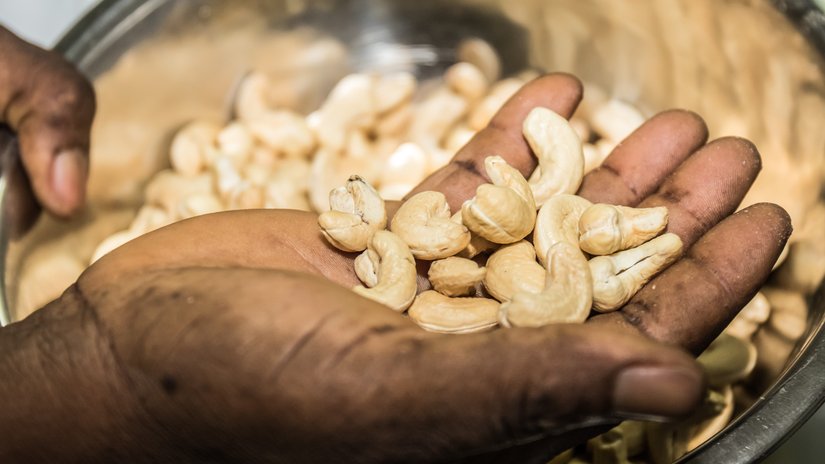No gloves? Hygiene and safety on the production line
Our employees usually don't wear gloves when processing food products – and for good reason.

"That's not clean!" is a common reaction when people see images of our processing facilities. It's immediately noticeable that our staff aren't wearing gloves. However, we don’t use gloves because they aren't necessarily more hygienic – and they’re certainly not sustainable. Quite the opposite, in fact.
International Hygiene Standards
The hygiene measures in place at our facility are far more effective than the use of gloves. Our cashew production follows the HACCP guidelines (Hazard Analysis and Critical Control Points), meaning we maintain the same high standards for food production and handling as facilities in Europe.
All areas where cashews are processed are designated hygiene zones. Before entering the plant, employees must wash their hands thoroughly – a practice we’ve all become familiar with since the Covid pandemic. They then change into work clothing and wear hair caps and masks.
These hygiene measures are highly effective, as confirmed by our inspections. We carry out microbiological analyses of our products several times a year. Any contamination resulting from inadequate hygiene would be flagged during these tests.
Hands need protection
Let’s not forget – gloves can be uncomfortable to wear. Hands tend to sweat inside plastic gloves, which can lead to skin irritation or rashes. It’s even riskier if the corrosive liquid from the cashew’s outer shell – released when the nut is cracked – seeps into the gloves. This liquid can cause chronic skin issues if not handled with care.
Our workers protect their eyes with safety goggles and their hands with cashew oil. This oil is a by-product of our production process, extracted from oily kernels that are not suitable for consumption. Cashew oil acts as a natural antidote to the corrosive shell liquid. At the end of the day, workers thoroughly clean their hands with maize flour and lemon juice to remove any remaining traces of the substance.
So, gloves only seem more hygienic – but they can become just as contaminated as bare hands. In the end, it’s clean hands and effective hygiene practices that truly make the difference.
Gloves create waste
Another important point: gloves must be changed several times a day and ultimately end up in the bin. With around 400 people working at our cashew processing plant, this would create a significant amount of plastic waste every day.
During the cracking process, our workers use a sharp-bladed tool to break open the hard outer shell of the cashew. At this stage, gloves tear easily – and bits of plastic could even end up in the nuts.
Once the shell is cracked, the workers remove the cashew kernel’s thin membrane using a small knife. This step requires a great deal of precision, and skilled use of the fingers ensures the nuts remain intact. Wearing gloves would make this delicate work much more difficult.
Justine Nana, who lives with her family in Bobo Dioulasso, Burkina Faso, shares more about her daily work in cashew processing in this video.

 Login
Login

